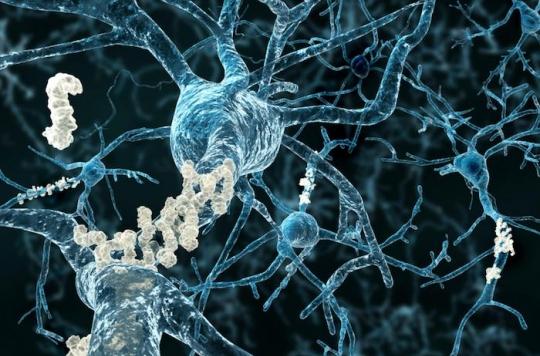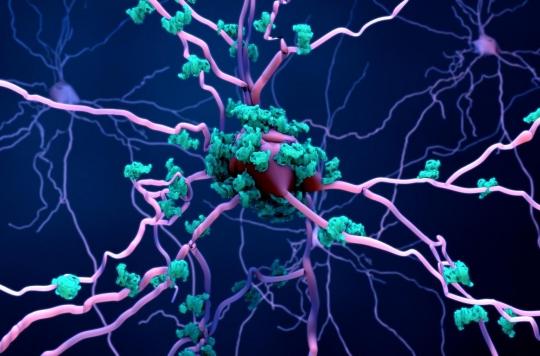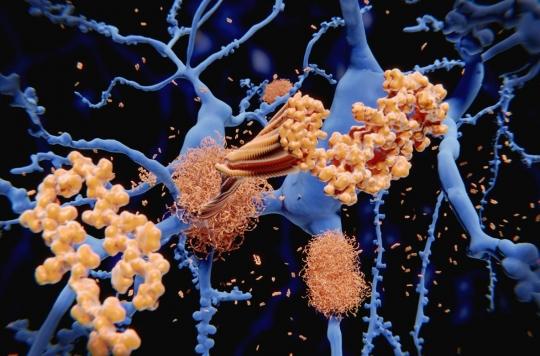In healthy people who have Alzheimer’s disease lesions in their brain, there are compensation mechanisms to maintain their intellectual and memory performance

The INSIGHT-preAD study shows that the presence of amyloid lesions in the brains of people over the age of 70 has no impact on cognition and behavior. These amyloid plaques are common in Alzheimer’s disease. At 30 months of follow-up, these lesions cannot therefore constitute a marker of progression to the disease.
This finding of lesions, present for more than 2 years without clinical disease, suggests that at the onset of Alzheimer’s disease there may be compensation mechanisms in people affected by these lesions, mechanisms that would allow them to live normally for at least 30 months. The results are published in the journal Lancet neurology.
A study in people at risk
The INSIGHT-preAD study (for “INveStIGation of AlzHeimer’s PredicTors in subjective memory complainers – Pre Alzheimer’s disease”), is a long-term prospective cohort follow-up study. It aims to observe in subjects aged over 70, in good health and without cognitive impairment, the factors of development of Alzheimer’s disease.
Launched in May 2013 at the Pitié-Salpêtrière AP-HP by Prof. Bruno Dubois and his INSERM team, this cohort includes 318 volunteers aged over 70, with a complaint of subjective memory, but whose cognitive and memory performances are poor. normal during testing. The participants initially agreed that the presence or absence of Alzheimer’s disease lesions (so-called “amyloid” lesions) in their brains could be determined by means of an imaging test.
Intervene earlier on the disease
The drugs currently in development for the treatment of Alzheimer’s disease show significant efficacy on brain lesions in patients, without however being able to effectively reduce the symptoms of the disease. Therapeutic trials would thus be carried out too late, at a stage where the disease is too advanced to be regressive under treatment.
Hence the idea of testing the effectiveness of treatments earlier during the disease, that is to say at the beginning, even before the appearance of any symptoms in patients with brain lesions of the disease. Alzheimer’s.
This strategy requires a better understanding of the markers of the progression of the disease at its preclinical stage in order to treat the people most at risk of progression.
Few differences related to the presence of plaques
When entering the INSIGHT-preAD study, 28% of the participants carried lesions even if they did not show any sign of Alzheimer’s disease: no difference was observed between people called “amyloid positive” and those “negative amyloid”, whether during cognitive (memory, language, orientation), functional and behavioral tests.
At two and a half years of follow-up, only four people progressed to Alzheimer’s disease. Upon entry into the study, these patients presented with predictive factors, such as older age, higher amyloid lesion concentration, and decreased hippocampal volume.
Differences in the electrical activity of the brain
The researchers did not note any significant change between amyloid positive subjects and those negative for all the markers (behavioral, cognitive, functional) observed, as well as in neuroimaging.
No difference was also observed between the 2 groups on the intensity of the memory complaint, nor in structural neuroimaging (MRI) or metabolic (PET-FDG).
On the other hand, the electroencephalogram, which measures the electrical functioning of nerve cells, shows in patients with lesions a modification of the electrical activity of the anterior regions of their brain, in particular the front, to maintain their intellectual and memory performance.
Very little progression to Alzheimer’s disease
These results thus show that the presence of cerebral amyloid lesions is not accompanied by cognitive, morphological, metabolic or functional modifications in people with these lesions.
The researchers, based on the electroencephalographic changes observed at the same time, suggest the existence of compensation mechanisms in the brains of these people with amyloid plaques.
The declared progression to Alzheimer’s disease in these patients aged 76 years on average is therefore low, which testifies to a significant cognitive reserve for this type of population. Continuing this monitoring is therefore necessary to determine whether this finding is still true after a longer period.
The INSIGHT-preAD study will be the subject of a new progress report in 2022.

.














